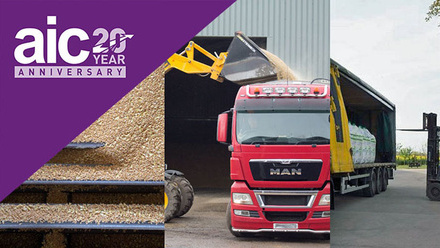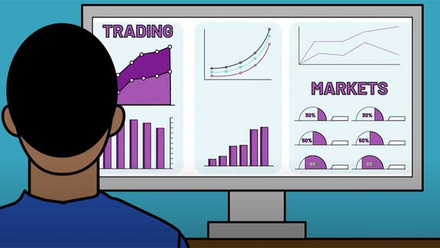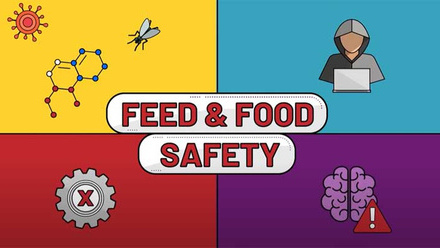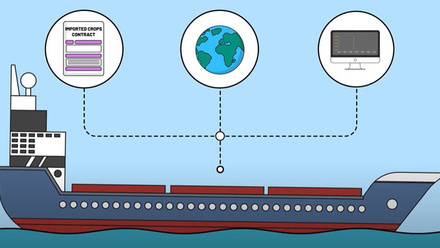FAQs: Standards for traded crops imported to the UK explained
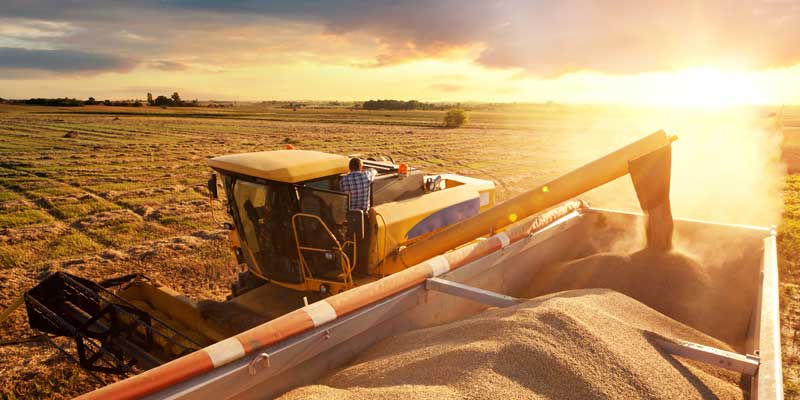
This article explains how crops are traded globally, why crops are imported, and how equivalent assurance schemes and rigorous testing mean crops from overseas are verified as meeting the same legal food and feed safety standards as UK-grown crops.
Introduction
Crops including grains, oilseeds, pulses and maize are global commodities that are traded internationally to meet the human food and animal feed needs of individual countries.
Countries across the world constantly manage their food stocks for human consumption - such as wheat used as a raw material to make bread - and feed for animals - including soya as a high protein ingredient in livestock feed.
Merchants monitor global and domestic supply and demand for crops, trading accordingly.
Watch the video below for an overview and read on for more detail.
Assurance schemes and the law
The UK operates an assured supply chain for its food and feed, meaning strict standards are met to safeguard the health of people and animals.
The supply chain is assured from UK farms to end-users through voluntary schemes which set standards to ensure that food and feed safety legislation is met.
This includes Red Tractor and Scottish Quality Crops at farm level, as well as AIC-operated trade assurance schemes such as the Feed Material Assurance Scheme (FEMAS), Universal Feed Assurance Scheme (UFAS), and Trade Assurance Scheme for Combinable Crops (TASCC).
Click below to read more about AIC's trade assurance schemes.
Contracts, international standards and testing
It is imperative that any crop imported to the UK from overseas meets the same legal food and feed safety standards as domestically produced crops.
This requirement is written into legally binding contracts between parties trading grain and other crops.
Crops grown in another country are also typically covered by an equivalent international trade assurance scheme which confirms they have met the same legal food and feed safety standards as domestically grown crops.
There is a network of assurance schemes worldwide, with many being connected by a reciprocal recognition of similar standards and practices.
This is how legal food and feed safety standards are upheld from country to country.
These robust international standards have been refined over many decades, ensuring that both domestically produced and imported crops meet the same legal requirements.
See the below FAQs for further details on the standards of equivalent assurance schemes used throughout the globe.
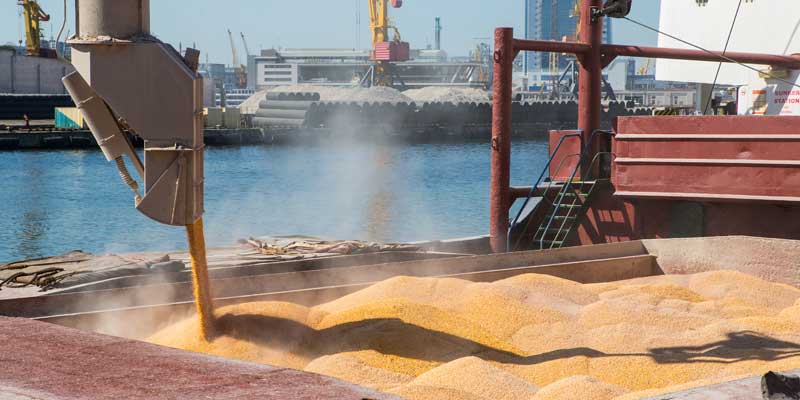
When shipping any crop to the UK from abroad, thorough tests and analysis must be conducted to verify that it meets food and feed safety standards.
The same is true of UK-grown crops destined for export where confidence is largely provided by UK assurance schemes. See the below FAQs for more details on testing.
It is the UK importers' knowledge of exporting countries' assurance schemes and food and feed safety laws which means crops grown abroad can be bought and imported with full confidence that they satisfy the UK's legal requirements. This is underpinned by contractual requirements and independent testing to prove the required standards are met.
This vital work conducted throughout the supply chain serves to protect the UK’s globally renowned food and feed safety standards.
Frequently Asked Questions
The frequently asked questions below explain the standards to which crops are imported to the UK.
Why does the UK import crops?
Countries around the world constantly manage their food stocks for human consumption and feed for animals.
Merchants monitor global and domestic supply and demand for crops, trading stocks accordingly.
Over the years, the UK’s domestic consumption has grown to meet national requirements. In years when production exceeds domestic consumption, surpluses can be exported.
The UK climate means certain varieties of cereals and other crops have to be imported. When domestic crops don’t meet yield or quality expectations, further imports may be required to cover these deficits.
This is why merchants and the end-users of the crops employ the principle of “as local as possible, and as global as necessary” to their businesses.
How are crops imported to the UK?
To import any crop to the UK, traders will typically use internationally-recognised assurance schemes such as Good Manufacturing Practice (GMP+) and the European Feed and Food Ingredient Safety Certification (EFISC-GTP) to verify that a crop has been grown to equivalent food and feed safety standards as UK-produced crops.
This gives confidence that the imported crop meets the UK's food and feed safety standards, as set out in law.
Additional checks and balances are also required to satisfy a buyer, and these form part of the legally binding contract between two trading parties. This involves rigorous testing to establish whether it meets the UK's legal food and feed safety standards.
The buyer or supplier must undertake a wide range of sampling and analysis for pesticide residues, mycotoxins, Genetically Modified Organisms (GMOs), heavy metals, and other elements, which are specified for the crop type, to ensure it meets all UK feed and food safety legal compliance.
To do this, incremental samples are taken as a ship is loaded at an overseas port to collect a representative sample for the entire consignment. Sampling is done to internationally agreed standards set by the Grain and Feed Trade Association (Gafta) to ensure global consistency. Find out more about these sampling rules on the Gafta website.
The test results determine whether the crop is within the defined acceptable limits and therefore meets the UK’s legal standards and any other customer requirements.
In the rare instance where any tests are failed, the shipment is rejected for the UK market as it may pose a risk to human and animal health. It must then find an alternative buyer with differing standards.
On arrival to the UK certain imported crops, such as milling wheat, are also subject to random inspections by competent government authorities.
Do UK-grown and imported crops meet the same standards?
Yes, as a minimum all crops that are imported from overseas must meet the same legally defined food and feed safety standards as UK-produced crops. Other factors such as sustainability, health and safety, and modern slavery law are also vital considerations.
Farmer and grower members of some UK voluntary assurance schemes may also be required to comply with other standards which are not part of the UK's food and feed safety laws.
The UK has a high market coverage of farms which are members of voluntary farm assurance schemes, such as Red Tractor Assurance and Scottish Quality Crops. These farm assurance schemes provide a due diligence defence in many areas, including feed and food safety.
Other countries may also have some farm-level standards, but these do not have the same market coverage as in the UK. This is why additional testing and monitoring is applied to imported crops to make sure these meet the UK's legal food and feed standards.
For more information on the UK's legal standards for food and feed, visit the Food Standards Agency (FSA) website.
What standards do imported crops meet and how robust are these?
Crops that are imported into the UK must meet food and feed safety standards as set out in UK law, just as domestically grown crops do.
Additionally, there are global principles of international food safety governed by the Food and Agriculture Organisation of the United Nations - the Codex Alimentarius - which some countries use.
Similar to the UK's assurances schemes, there are numerous schemes operated in Europe and across the globe.
Think of these UK-only and international assurance schemes as a network, where a common reciprocal acknowledgement of each other’s standards and practices exists to provide confidence for all.
International assurance standards - such as Good Manufacturing Practice (GMP+) for animal feed, and the European Feed and Food Ingredient Safety Certification (EFISC-GTP) for human consumption and animal feed - are recognised and applied to many food and feed supply chains across the world to give confidence that imported crops meet the food and feed safety regulations of that particular country.
With over 19,000 GMP+ certified companies in over 87 countries, the GMP+ Feed Certification (GMP+ FC) scheme is the largest and most widely-recognised feed safety scheme in the world.
Both GMP+ and EFISC-GTP recognise that the UK-based Trade Assurance Scheme for Combinable Crops (TASCC), the Universal Feed Assurance Scheme (UFAS), and the Feed Materials Assurance Scheme (FEMAS) are accepted as equivalent assurance standards and audited under parallel requirements that cover points which include:
- Management responsibility - including HACCP system and review, resource management within the company
- Safe handling of goods and preventing cross-contamination
- Storage, transport and shipping
- Traceability, inspection, sampling, analysis and auditing
- Building maintenance, disinfecting premises and stores, sanitation, pest and waste control
These equivalent standards are what underpins the reciprocal recognition between schemes in the UK and around the world for imported crops.
What is a "Gatekeeper Protocol"?
A “Gatekeeper Protocol”, or “gatekeeping”, is a generic term used to describe a range of stringent controls which provide food and feed safety assurance for crops produced in other countries.
One part of this is crop sampling, testing and analysis which is done to internationally agreed standards set by the Grain and Feed Trade Association (Gafta) to ensure global consistency. The significant cost of this testing is factored into the sale price of the crop.
This extensive testing process is independently overseen and is essential for food and feed processors and end-users because it satisfies the product assurance that they require for traceability and safety.
For further details, watch AIC's narrated presentation.
Why did parts of the industry ask that consideration be given to the introduction of a "Gatekeeper Protocol" for UK-grown crops?
In late 2021, Assured Food Standards, the National Farmers Union (NFU), and a group of cereal farmers asked for this to be considered.
Some considered that a "Gatekeeper Protocol" could have given UK farmers an alternative route to market, instead of compliance with the current farm assurance schemes.
Some farmers were also dissatisfied with certain elements of farm assurance, as such the standard content and methods of auditing.
To investigate the viability and suitability of using a "Gatekeeper Protocol" for domestic non-assured crops, AIC raised this with its Committees following an in-depth assessment by the agri-supply industry in early 2022.
After evaluating all of the options, it was concluded that at present this would be both more expensive and complex than existing alternative processes, with no added value.
The investigation found that there is no demand for such as a process from end-users and processors, or AIC Members within the Arable Marketing and Animal Feed sectors.
To reach this conclusion, AIC worked with the Crop Stakeholder Group and various AIC Committees over this period to ensure that the view of the whole supply chain was taken into careful consideration.
These stakeholders included the National Farmers Union (NFU), Agricultural and Horticultural Development Board (AHDB), Red Tractor Assurance, UK Flour Millers, Maltsters Association of Great Britain, and various other industry representatives. The group was chaired by the NFU.
Within AIC various committees were consulted, including the Arable Marketing Committee and Feed Executive Committee, as these represent more than 95% of the industry which trades and processes crops in the UK. The feed and food assurance scheme groups for UFAS, TASCC and FEMAS were also consulted.
For further details, watch AIC's narrated presentation or read AIC's position statement [PDF].


